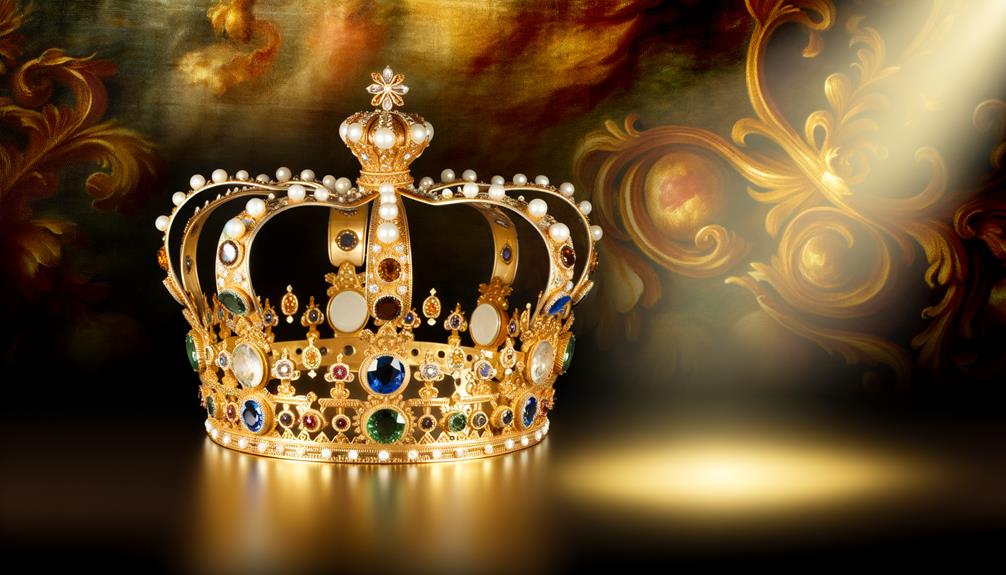Prince Name Meaning in English
The name 'Prince' derives from the Latin term 'princeps,' which combines 'primus' (first) and 'capere' (to seize). Historically, it signified the heir to the throne and a pivotal figure in the succession of monarchies.
Over time, the term has evolved culturally and symbolically, representing leadership, moral fortitude, and youthful potential. It has also influenced literature, arts, and tradition, embodying ideals of ethical leadership and societal values.
Notable figures bearing the name include Prince Albert, Siddhartha Gautama, and the modern musician, Prince. Exploring deeper reveals its broad historical significance and contemporary cultural impact.

Key Takeaways
- The name 'Prince' originates from the Latin word 'princeps,' meaning 'first' or 'chief.'
- 'Prince' historically denotes the heir to a throne and a key figure in monarchical succession.
- The name symbolizes leadership, youthful potential, and future promise.
- Modern interpretations of 'Prince' emphasize personal empowerment, creativity, and innovation.
- 'Prince' carries significant cultural weight, reflecting both historical reverence and contemporary values.
Etymology of 'Prince'
The term 'prince' derives from the Latin word 'princeps,' which historically signified the foremost or chief person in authority. In Latin, 'princeps' combines 'primus' (first) and 'capere' (to seize), reflecting a role of primary leadership and preeminence.
Over time, this nomenclature evolved across various languages and cultures, retaining its connotation of precedence and governance. In Old French, it emerged as 'prince,' and subsequently shifted into Middle English.
The etymological journey underscores the term's association with nobility and hierarchical dominance. This lexical evolution emphasizes the term's enduring linkage to positions of power and influence, illustrating its rootedness in socio-political structures.
Consequently, the word 'prince' encapsulates both historical and linguistic dimensions of leadership and authority.
Historical Significance
Building on its etymological roots, the title of 'prince' has held significant historical importance as it often denoted the heir to the throne, a key figure in monarchical succession and governance. Princes typically wielded substantial influence, managing estates and leading military campaigns. Their roles were pivotal in shaping policies and ensuring the continuity of dynastic power. The historical significance of the title is evident in various monarchies around the world.
| Region | Historical Role of Prince |
|---|---|
| Europe | Heir to the throne, military leader |
| Asia | Provincial governor, cultural patron |
| Middle East | Diplomatic envoy, tribal leader |
In these capacities, princes were integral to both the stability and expansion of their respective domains.
Cultural Impact
Reflecting societal values and norms, the title of 'prince' has profoundly influenced cultural traditions, literature, and the arts throughout history.
In literature, princely characters often embody virtues such as bravery, wisdom, and nobility, shaping ideals of leadership and morality. Classic works like Shakespeare's 'Hamlet' and Antoine de Saint-Exupéry's 'The Little Prince' illustrate the complex roles princes play in narrative structures.
In the arts, the image of the prince has been immortalized in paintings, sculptures, and operas, symbolizing power and elegance. Additionally, cultural ceremonies and rituals, such as those in royal courts, have historically reinforced the reverence for princely figures, perpetuating their esteemed status.
This pervasive influence underscores the deep-seated cultural significance attributed to the title.
Symbolism and Attributes
Often imbued with symbolic significance, the title of 'prince' encompasses a range of attributes that historically denote authority, virtue, and nobility. In medieval and Renaissance contexts, a prince was seen as a paragon of moral and ethical leadership, embodying the ideals of chivalry and honor.
The title also implies a direct connection to sovereign power, serving as a bridge between the ruling monarch and the governed populace. Moreover, the prince often symbolizes youthful potential and future promise within a dynastic lineage, carrying the weight of expectations for continuity and stability.
These attributes collectively reinforce the prince's role not merely as a figurehead, but as a pivotal entity in the sociopolitical and cultural fabric of a society.
Famous Namesakes
Throughout history, numerous notable individuals have borne the title of 'prince,' each leaving an indelible mark on their respective eras through their actions and legacies. These individuals span various domains, from governance and diplomacy to the arts and social movements. Their contributions often transcend their titles, impacting global history in profound ways.
Some distinguished names include:
- Prince Albert: Consort to Queen Victoria, influential in British industrial advancements.
- Prince Siddhartha Gautama: Founder of Buddhism, whose teachings have shaped spiritual practices worldwide.
- Prince Henry the Navigator: Key figure in Portuguese explorations during the Age of Discovery.
- Prince Charles: Longest-serving heir apparent in British history, active in environmental advocacy.
- Prince: Iconic American musician known for his transformative impact on the music industry.
Popularity Over Time
The name 'Prince' has experienced varying levels of popularity over time, influenced by historical events and cultural shifts.
Regional variations also play a significant role, with certain areas showing a stronger affinity for the name.
Additionally, notable figures and media portrayals have periodically impacted its usage and societal acceptance.
Historical Popularity Trends
Over the centuries, the name Prince has experienced fluctuating levels of popularity, influenced by cultural, social, and historical factors. This moniker, symbolizing nobility and leadership, has seen varying trends:
- Medieval Era: Rarely used, as titles were often reserved for actual royalty.
- Renaissance Period: Slight uptick due to romanticism of noble titles.
- 19th Century: Modest increase, reflecting a fascination with aristocracy in literature and theater.
- 20th Century: Popularized in part by the American musician Prince, leading to a notable spike.
- 21st Century: Continued moderate use, reflecting diverse cultural influences and a penchant for unique names.
These trends highlight the name's enduring appeal and its periodic resurgence in public consciousness.
Regional Popularity Variations
In different regions, the name Prince has exhibited varying degrees of popularity, often reflecting local cultural values and historical influences.
In the United States, the name saw a notable rise in the latter half of the 20th century, influenced by popular culture and media.
Conversely, in the United Kingdom, the name has been traditionally less common, perhaps due to its strong association with royalty, making it less accessible as a common given name.
In African nations, particularly Nigeria, the name Prince holds significant cultural weight, symbolizing nobility and leadership.
These regional variations highlight how cultural context and historical narratives shape the adoption and frequency of the name Prince over time.
Influences on Popularity
Cultural phenomena have heavily influenced the popularity of the name Prince over different historical periods. This name's allure has waxed and waned due to various societal and cultural factors.
Key influences include:
- Royalty: Historical associations with princes in monarchies have lent the name a regal, prestigious connotation.
- Music: The iconic musician Prince significantly influenced the name's popularity during the late 20th century.
- Literature: Classic and contemporary literature featuring princely characters has perpetuated the name's appeal.
- Media: Films and television series highlighting princely figures often trigger spikes in the name's usage.
- Celebrity Influence: Public figures naming their children Prince can lead to increased adoption.
These elements collectively shape the name's enduring and fluctuating prominence in society.
Usage in Literature
The name 'Prince' has frequently appeared in literature, often symbolizing nobility, power, and the complexities of royal life. In Shakespeare's works, characters like Prince Hamlet and Prince Hal depict the struggles and responsibilities inherent to royalty.
Similarly, Machiavelli's 'The Prince' explores the political machinations and ethical dilemmas faced by rulers, establishing the name as synonymous with authority and governance.
In children's literature, Antoine de Saint-Exupéry's 'The Little Prince' offers a more philosophical and introspective take, reflecting innocence and the quest for meaning.
These literary works utilize the name 'Prince' to explore themes of leadership, morality, and identity, illustrating the multifaceted roles that individuals bearing this title often navigate.
Modern Interpretations
In contemporary society, the name 'Prince' carries significant cultural weight, reflecting evolving naming trends and societal values. Its use has been influenced by modern media, celebrity culture, and ongoing associations with royalty.
This section will explore how these factors shape the name's perception and relevance today.
Cultural Significance Today
Amidst the evolving societal landscape, the name 'Prince' has garnered contemporary relevance, reflecting unique cultural narratives and modern values. Historically associated with royalty and power, today, 'Prince' transcends its traditional roots, symbolizing a blend of individuality and aspiration. This evolution is evident in various dimensions of modern culture:
- Entertainment Icons: Influence of celebrities like Prince Rogers Nelson, who redefined music and identity.
- Literature and Media: Representation of noble traits and heroism in modern storytelling.
- Fashion and Branding: Adoption of regal aesthetics in contemporary design and marketing.
- Societal Values: Emphasis on personal empowerment and leadership.
- Globalization: Cross-cultural appeal and adaptation in diverse communities.
This multifaceted significance highlights the name's enduring, yet dynamic presence in today's world.
Evolving Name Trends
Modern interpretations of the name 'Prince' reveal a fascinating change, influenced by contemporary societal values and trends. Historically associated with nobility and leadership, the name now embodies a broader spectrum of attributes such as charisma, innovation, and individuality.
This evolution reflects a society increasingly valuing personal distinction over hereditary privilege. In popular culture, figures like the artist Prince have redefined the name, emphasizing creativity and self-expression.
Parents today are often drawn to 'Prince' for its aspirational connotations, hoping to imbue their children with qualities of nobility in character rather than lineage. Consequently, 'Prince' has shifted from a symbol of inherited status to one representing modern virtues and personal achievement.
Contemporary Royal Associations
Contemporary royal associations with the name 'Prince' highlight a nuanced blend of historical reverence and modern reinterpretations, reflecting its persistent yet evolving cultural significance. The name continues to be emblematic of nobility and authority, while also embracing contemporary shifts in cultural context.
Modern associations include the following:
- Prince Harry: A prominent figure in British royalty, representing modern humanitarian efforts.
- The Artist Formerly Known as Prince: Symbolizing a revolutionary approach to identity and artistry.
- Prince George: A young royal, embodying the future of the British monarchy.
- Prince William: Balancing traditional royal duties with modern public engagements.
- Prince Rainier III of Monaco: An example of royalty blending with Hollywood through marriage to Grace Kelly.
These examples illustrate the name's dynamic relevance in contemporary contexts.
Conclusion
The name 'Prince' encapsulates a rich tapestry of historical and cultural significance, symbolizing nobility, leadership, and prestige.
Surprisingly, according to the U.S. Social Security Administration, the name 'Prince' experienced a notable surge in popularity, ranking within the top 300 names for boys in 2018.
This resurgence reflects modern society's enduring fascination with regal imagery and the storied legacy associated with the title.
The name continues to evoke a sense of grandeur and timeless appeal.






